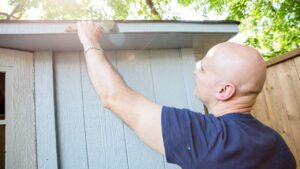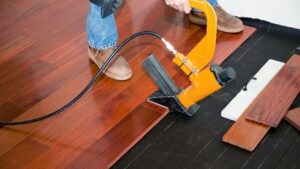Homeownership brings many joys, but it also comes with responsibilities, including home maintenance and repairs. One of the common repairs homeowners face is fixing drywall damage. Whether it’s a small hole from a doorknob or major water damage, drywall repairs are inevitable.
Understanding the potential costs involved in drywall repair can help you budget for these home maintenance tasks. Plus, it can help you decide whether to tackle the repair yourself or call in a professional. In this guide, we will walk you through the typical costs associated with drywall repair.
Average National Cost Of Drywall Repair
The cost of drywall repair can vary greatly, depending on the extent of the damage and your location. However, we can give you a general idea based on national averages.
Most homeowners in the U.S. spend between $294 and $924 on drywall repair, with the average cost hovering around $608. However, prices can go as high as $1,077. It’s important to note that these are average costs and the actual price you pay may be higher or lower depending on various factors, which we’ll explore later.
Cost Breakdown By Project Size
The size of the drywall repair project has a significant impact on the cost. Here’s a quick breakdown of typical costs based on the size of the repair:
- For a small hole (up to 4 in.), you’re likely to pay between $20 and $120 per hole.
- If you have several small holes, the cost can go up to $300.
- The repair of a 2 sq. ft. area may cost you from $100 to $170.
- A 4 sq. ft. repair job might be priced between $200 and $340.
- An 8 sq. ft. repair can cost between $400 and $680.
- If the damaged area is 10 sq. ft., expect to pay between $500 and $850.
- For a larger area, like 20 sq. ft., the repair might cost between $1,000 and $1,700.
These are just estimates, and the actual cost may vary based on the complexity of the job and other factors. In addition, professionals usually charge between $50 and $80 per square foot for drywall repair. If they charge by the hour, expect to pay between $60 and $100 per hour.
While these numbers give you a ballpark figure, it’s also important to remember that each project is unique. Various factors can influence the final cost of your drywall repair, including the extent of the damage, the location of the damage, local labor rates, and the quantity of repairs needed. We’ll discuss these factors in more detail later in this guide.
Cost By Type Of Damage
The cost of drywall repair can also be influenced by the specific type of damage. Minor cracks, for example, may only require a small investment, with costs ranging from $10 to $450. Small holes fall into a similar category, with repair costs typically between $10 and $135.

When it comes to larger holes, the cost increases significantly. You can expect to spend anywhere from $60 to $225 to have these repaired. Dents in the drywall may set you back between $10 and $160, while tears might cost between $25 and $130 to fix.
Other types of drywall damage, such as nail pops, can be relatively inexpensive to repair, with costs usually falling between $10 and $70. However, damage to the ceiling or instances of water damage can be quite costly. Ceiling repair costs tend to range from $230 to $1,400, while water damage repair can cost between $550 and $1,600.
DIY vs. Professional Drywall Repair Costs
Deciding on whether to repair drywall damage yourself or hire a professional is another important consideration. For small holes, DIY repair kits can be a cost-effective option, with prices typically ranging from $10 to $30.
However, for more complex repairs, a professional might be necessary. For small jobs like fixing cracks or nail pops, professional services can range from $60 to $200. It’s important to weigh the severity of the damage, your level of expertise, and the potential cost savings when deciding on the best course of action.
Factors Affecting Drywall Repair Costs
Several factors can affect the cost of drywall repair. The extent and location of the damage are key contributors. If the damage is extensive or located in a difficult-to-reach area, like the ceiling, the cost of repair can increase.
Local labor rates can also influence the cost. If you live in an area where labor rates are high, you might end up spending more on professional repair services. Similarly, the number of repairs needed can impact the cost. If your drywall has multiple areas of damage, the repair cost can add up quickly.
Lastly, the materials required for the repair can affect the overall price. If your drywall requires special finishes or textures, this can increase the cost of materials and, consequently, the total repair cost.
So, as you can see, while drywall repair is a common home maintenance task, the cost can vary widely. By understanding these cost factors, you can better anticipate what you might spend on drywall repair and make an informed decision on whether to do it yourself or hire a professional.
Tips For Saving On Drywall Repair Costs
Are you looking to save some hard-earned cash on your drywall repair costs? There are a few strategies you can employ to keep these expenses manageable. Let’s explore these money-saving tips together.
Firstly, consider the DIY route for minor repairs. Small holes, minor cracks, and simple dents can often be fixed with a basic drywall repair kit that costs between $10 and $30. By handling these minor repairs yourself, you can save a considerable amount on labor costs.
Moreover, try to bundle your repairs. If you’ve several areas in your house that need attention, consider grouping them together into one project. Typically, professionals charge less per repair when they’re tackling multiple issues in a single visit.
Another money-saving tip is to shop around for the best quotes. Don’t just settle for the first contractor you find. Instead, get estimates from several professionals to ensure you’re getting the best rate. Just make sure you’re comparing apples to apples – the lowest quote might not include all the services you need.
Lastly, keep up with regular maintenance. By addressing minor issues as soon as they appear, you can prevent them from escalating into major, and more costly, problems. Regular inspections and prompt repairs can save you a lot in the long run.
When To Hire A Professional For Drywall Repair?
While the DIY route can save you money, it’s not always the best option. Certain drywall repairs require a professional touch. But how do you know when it’s time to call in the pros?
If the drywall damage is extensive, such as large holes or significant water damage, it’s best to hire a professional. These types of repairs can be complex and require specialized tools and knowledge. A professional can ensure the job is done right, preventing future issues and potentially saving you money in the long run.
Additionally, if the damage is in a hard-to-reach area, like the ceiling or a high wall, it’s safer to hire a professional. Working at heights can be dangerous without the right equipment and experience.
Lastly, if you’re short on time or simply don’t feel comfortable handling the repair yourself, it’s worth hiring a professional. While the upfront cost might be higher, the peace of mind and quality workmanship can be well worth the investment.
Conclusion
Understanding drywall repair costs can equip you to make informed decisions and plan your budget effectively. Remember, the costs can vary significantly depending on the size, type, and location of the damage, as well as local labor rates and the number of repairs needed.
While it’s possible to save on these costs with DIY repairs and smart planning, don’t hesitate to hire a professional when necessary. After all, nothing beats the assurance of quality work done safely and efficiently.





